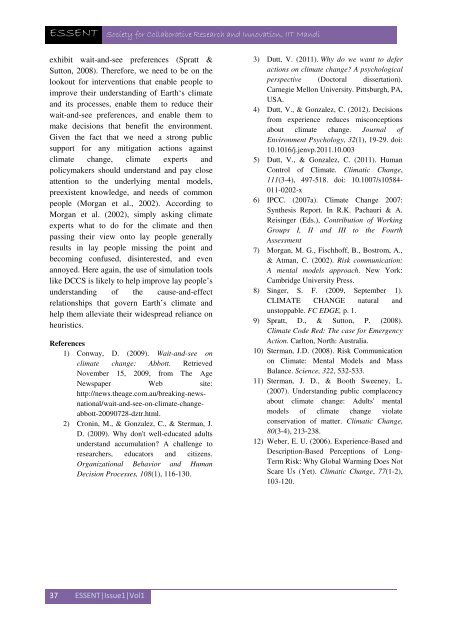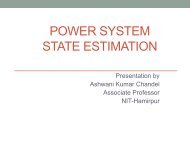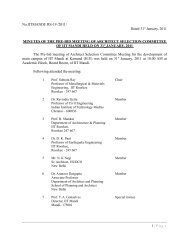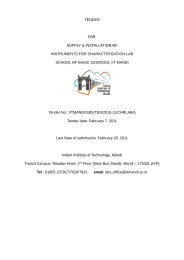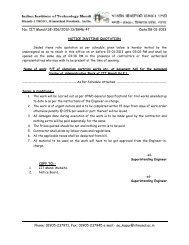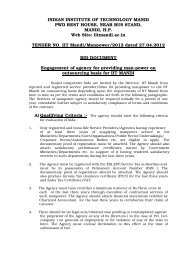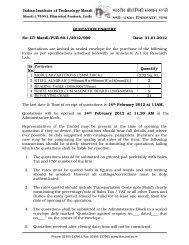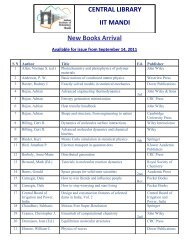ESSENT Society for Collaborative Research and Innovation, <strong>IIT</strong> <strong>Mandi</strong>Dutt & Gonzalez, 2011; Dutt & Gonzalez,2012). Results from using a simulation-basedtool called the Dynamic Climate ChangeSimulator (DCCS) have been particularlynoteworthy. DCCS (see Figure 2) providesrepeated feedback on the changes in the CO 2concentration each year as a result of CO 2emission and absorption policies set byparticipants, allowing participants to observe theresults of their decisions as they try to controlthe CO 2 concentration to a goal (Dutt &Gonzalez, 2012). One main and consistent resultis that acquiring experiential feedback in theDCCS helps to reduce participants’misconceptions about the way the climatesystem works.Experiential feedback in DCCS enablesparticipants to test several hypotheses theymight have about how CO 2 emission andabsorption processes affect the CO 2concentration. It is likely that the ability to testseveral hypotheses repeatedly about the causeand-effectrelationship in DCCS enables them tounderstand that the concentration increaseswhen CO 2 emissions are greater thanabsorptions, decreases when emissions are lessthan absorptions, and stabilizes at a particularvalue when emissions equal absorptions.Therefore, it seems that the experience gained inDCCS is likely to enable participants todecrease their reliance on the correlationheuristic and mass balance violation. Thisexpectation has indeed been found to be true.For example, in the CMU study describedabove, participants who interacted with DCCSbefore encountering the CS task reduced theirreliance on correlation heuristic (60%) and massbalance violation (57%) (Dutt, 2011).The above explanations about feedback inDCCS are supported by similar findings forother dynamic tasks. For example, researchers atGeorge Mason University have suggested thatparticipants can get increasingly accurateanswers in simple dynamic tasks with even just“correct/incorrect” feedback given for repeatedattempts. In the first attempt, only 15% of theirparticipants answered the accumulation questioncorrect, but 80% of the participants were able tosolve the problem correctly by the seventhattempt (Cronin, Gonzalez, & Sterman, 2009).In summary, in this article, I have proposed theuse of computer-simulation tools (like DCCS)for alleviating people’s heuristics and biases forour climate system. One could make of suchtools for education purposes in schools andcolleges, as well as an effective computationalaid during policymaking for climate change.Future research would benefit by investigatingthe unique features of these simulation tools thatmake them as effective climate models andpedagogic approaches to science, mathematics,and engineering teaching. Also, future researchwould benefit by investigating the connectionbetween public’s reliance on heuristics for ourclimate system and their socio-demographicsfactors (e.g., gender, age, income, citizenship,educational level, race or ethnicity, politicalparty identification, and political ideology).Furthermore, it would be interesting toinvestigate whether the influence of sociodemographicfactors on heuristic reliance ismoderated by people’s interaction with DCCSlikesimulation tools.There is substantial scientific evidence thatclimate change would occur with catastrophicconsequences in the near future if we continueon a path of increasing greenhouse gasemissions (IPCC, 2007a). The 1992 RioDeclaration on Environment and Development(UNCED, 1993, Article 15) gave the world the“precautionary principle” for resolving theclimate change problem: “a lack of fullscientific certainty should not be used to justifypostponing cost-effective measures in the faceof threat of serious or irreversible harm.” From apublic-policy perspective, given theuncertainties present in the probability, timing,and costs of future climate consequences, manypeople advocate that we should follow aprecautionary approach to climate change andthat policies should be such that they causepeople to act on climate change rather than36 ESSENT|Issue1|Vol1
ESSENT Society for Collaborative Research and Innovation, <strong>IIT</strong> <strong>Mandi</strong>exhibit wait-and-see preferences (Spratt &Sutton, 2008). Therefore, we need to be on thelookout for interventions that enable people toimprove their understanding of Earth‘s climateand its processes, enable them to reduce theirwait-and-see preferences, and enable them tomake decisions that benefit the environment.Given the fact that we need a strong publicsupport for any mitigation actions againstclimate change, climate experts andpolicymakers should understand and pay closeattention to the underlying mental models,preexistent knowledge, and needs of commonpeople (Morgan et al., 2002). According toMorgan et al. (2002), simply asking climateexperts what to do for the climate and thenpassing their view onto lay people generallyresults in lay people missing the point andbecoming confused, disinterested, and evenannoyed. Here again, the use of simulation toolslike DCCS is likely to help improve lay people’sunderstanding of the cause-and-effectrelationships that govern Earth’s climate andhelp them alleviate their widespread reliance onheuristics.References1) Conway, D. (2009). Wait-and-see onclimate change: Abbott. RetrievedNovember 15, 2009, from The AgeNewspaper Web site:http://news.theage.com.au/breaking-newsnational/wait-and-see-on-climate-changeabbott-20090728-dztr.html.2) Cronin, M., & Gonzalez, C., & Sterman, J.D. (2009). Why don't well-educated adultsunderstand accumulation? A challenge toresearchers, educators and citizens.Organizational Behavior and HumanDecision Processes, 108(1), 116-130.3) Dutt, V. (2011). Why do we want to deferactions on climate change? A psychologicalperspective (Doctoral dissertation).Carnegie Mellon University. Pittsburgh, PA,USA.4) Dutt, V., & Gonzalez, C. (2012). Decisionsfrom experience reduces misconceptionsabout climate change. Journal ofEnvironment Psychology, 32(1), 19-29. doi:10.1016/j.jenvp.2011.10.0035) Dutt, V., & Gonzalez, C. (2011). HumanControl of Climate. Climatic Change,111(3-4), 497-518. doi: 10.1007/s10584-011-0202-x6) IPCC. (2007a). Climate Change 2007:Synthesis Report. In R.K. Pachauri & A.Reisinger (Eds.), Contribution of WorkingGroups I, II and III to the FourthAssessment7) Morgan, M. G., Fischhoff, B., Bostrom, A.,& Atman, C. (2002). Risk communication:A mental models approach. New York:Cambridge University Press.8) Singer, S. F. (2009, September 1).CLIMATE CHANGE natural andunstoppable. FC EDGE, p. 1.9) Spratt, D., & Sutton, P. (2008).Climate Code Red: The case for EmergencyAction. Carlton, North: Australia.10) Sterman, J.D. (2008). Risk Communicationon Climate: Mental Models and MassBalance. Science, 322, 532-533.11) Sterman, J. D., & Booth Sweeney, L.(2007). Understanding public complacencyabout climate change: Adults' mentalmodels of climate change violateconservation of matter. Climatic Change,80(3-4), 213-238.12) Weber, E. U. (2006). Experience-Based andDescription-Based Perceptions of Long-Term Risk: Why Global Warming Does NotScare Us (Yet). Climatic Change, 77(1-2),103-120.37 ESSENT|Issue1|Vol1


